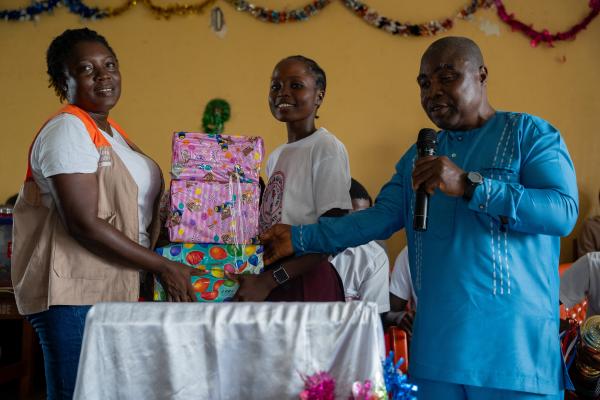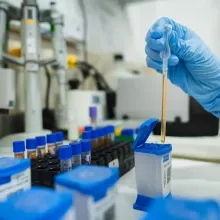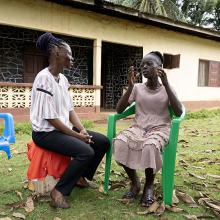Partners In Health (PIH) Liberia, in partnership with the United Nations Population Fund (UNFPA), County Health Team (CHT) and key stakeholders, including local education authorities, community leaders, schools, and non-governmental organizations, has intensified collaborations aim at raising awareness to combat teenage pregnancy in Maryland County. The partnership shows a shared commitment to tackling the root causes of teenage pregnancy and implementing sustainable solutions that prioritize adolescent health and well-being.
In June 2025, an inter-school quiz competition was organized as part of these efforts, involving three secondary schools: Cape Palmas, John Hilary Tubman, and George T. Brewer high schools in Harper City. Hosted at Cape Palmas High School, the event focused on the theme: “Advancing Comprehensive Sexuality Education in Maryland County through Multi-Sectoral Collaboration to Amplify Adolescents and Youth Advocacy through Schools’ Health Clubs.”
The competition aimed to evaluate students’ understanding of Comprehensive Sexuality Education (CSE) as part of Sexual and Reproductive Health and Rights (SRHR), promote awareness among students and teachers, and encourage academic excellence, critical thinking, and collaboration. Sixty students participated, alongside moderators, judges, principals, and representatives from the Ministry of Youth and Sports, the County Education Office, district education officers, teachers, and PIH staff. The event saw lively audience engagement, with enthusiastic participation from students, teachers, and observers. Certificates were awarded to all participating schools, while the two finalists received trophies and prizes.
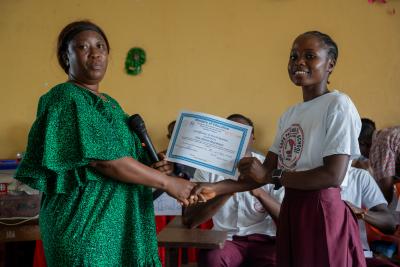
Annie Slewion, Principal of the Cape Palmas Senior High School in Maryland County, certificates Mercy T. Hinneh, captain of the Cape Palmas Senior High School team at the end of the quizzing competition. Photo by Ansumana O. Sesay / PIH
Cape Palmas High School Principal Annie T. Sleweon urged students to leverage the educational opportunities provided by PIH and the Ministry of Health through the County Health Team to avoid early childbearing. She said,
Having a child [at an early age] becomes your responsibility, making life much harder.
Reflecting on her own experience, she highlighted how discussions about menstruation and sex education were once taboo but expressed pride in the current level of enlightenment among students and adolescents.
Supported by the UNFPA’s Universal Access to SRHR program, funded by the Swedish Government, these initiatives aim to eliminate barriers to care and education. The program fosters a nurturing environment to help adolescents stay healthy, remain in school, and achieve their full potential. Teenage mothers often face adverse pregnancy outcomes and limited educational opportunities compared to young women who delay childbearing, as emphasized in the 2019 Liberia Demographic and Health Survey (LDHS).
Efforts also include community outreach initiatives, interactive sessions for adolescents, and improved access to reproductive health education and services through a three-point model for SRHR service delivery. This model focuses on education, accessibility, and empowerment, ensuring young people receive accurate information, access to resources, and the confidence to make informed decisions about their reproductive health.
These services are delivered across eight Youth Friendly Centers (YFCs), eight schools, and through various community engagement initiatives in Maryland County, Southeast Liberia. The YFCs provide safe spaces for adolescents to access confidential counseling, contraceptives, and tailored educational materials. Schools and community-based programs encourage open discussions, peer learning, and mentorship opportunities to break stigmas surrounding reproductive health. The impact has been significant, benefiting both adolescents and their families.
Elizabeth Sieh, an 81-year-old trained traditional midwife (TTM) in Karloken, Karluway District, expressed gratitude for the free family planning services available in her community, particularly at the Edith Wallace Youth Friendly Center. Her three granddaughters, enrolled in family planning services since 2021, remain healthy and continue their education at Karloken Demonstration Elementary School.
I thank God for the doctors and everyone supporting this family planning program; it’s truly helping us here in Karloken, Elizabeth shared.
In rural Liberia, teenagers tend to begin childbearing earlier than their urban counterparts, with River Cess County showing the highest prevalence (55%) compared to Maryland County (19%). The report highlights that teenagers with no education (47%) are significantly more likely to start childbearing than those with some education (20%-31%). These findings underscore the critical role of awareness and education in preventing teenage pregnancies and empowering young people to make informed life choices.
Between 2023 and 2024, a total of 26,595 adolescents accessed family planning services at the county’s eight youth-friendly centers, with 16,583 utilizing the services in 2023 and 10,012 in 2024, according to the Ministry of Health’s DHIS2 data. Since 2018, strategic partnerships and targeted interventions have contributed to a 19% reduction in teenage pregnancy rates in Maryland County.
Despite progress, teenage pregnancy remains a significant challenge in Liberia. The World Bank reported in 2023 that 126 out of every 1,000 girls aged 15-19 in Liberia gave birth, reflecting a high teenage pregnancy rate, though it has declined since 2010. In Maryland County, Liberia, approximately one in three girls aged 15-19 are either mothers or pregnant.
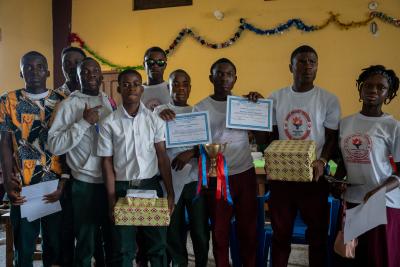
Members of the John Hilary Tubman High School quizzing team display their gifts and certificates at the end of the competition. Photo by Ansumana O. Sesay / PIH
For 16-year-old Jappy Williams (not her real name), a student in Maryland County, family planning services have been life-changing. She has been visiting the James Jenkins Dossen (JJD) Memorial Hospital Youth Friendly Center for two years to receive her injectable contraceptive every three months.
I was 14-year-old, in the 4th grade, when some friends introduced me to family planning services. Since then, I have actively embraced the services, and they have supported my education, she said.
